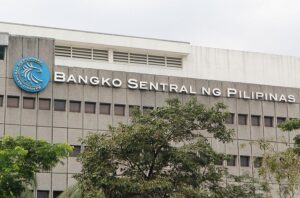The Bangko Sentral ng Philippines (BSP) lowered its policy rate by 25 basis points (bps) after four years as the country’s inflation rate might have already peaked.
In anticipation of a slowdown in inflation in the upcoming months, the BSP Monetary Board decided to cut the reverse repurchase (RRP) rate by 25 basis points to 6.25 percent at the rate-setting meeting on Thursday, August 15.
Interest rates for loan facilities and overnight deposits have been changed to 6.75 percent and 5.75 percent, respectively.
The last time the central bank lowered the policy rate was on November 19, 2020, in response to the pandemic-caused recession, which forced the BSP to lower borrowing rates to all-time lows.
Despite a slight increase in July, BSP Governor Eli M. Remolona Jr. said in a press briefing that headline inflation is predicted to reduce and stay below the government’s goal range of two percent to four percent.
The BSP reduced its estimate of this year’s risk-adjusted inflation from 3.1 percent to 3.3 percent. In a similar vein, the 3.0 percent prediction for 2025 has been lowered to 2.9 percent. It is set at 3.3 percent for 2026.
“The balance or risks to the inflation outlook continues to lean toward the downside for 2024 and 2025 with a modest tilt to the upside for 2026,” Remolona said.
“The downside risks are linked mainly to lower import tariffs on rice, while upside risks could come from higher electricity rates and external factors,” Remolona added.
Remolona saiid in May that the central bank was “less hawkish” at the time and that medium-term domestic output growth was “largely intact.” This suggested that rates might be dropping in August.
Due in large part to robust spending activities during the quarter, the Philippine economy expanded by 6.3% in the second quarter, the highest growth rate in the previous five.
Remolona, however, said on Thursday that the central bank was more optimistic about the slowdown of inflation than the expansion of the economy.
“[I’m] somewhat more confident in the inflation numbers coming down than the GDP (gross domestic product) numbers going up,” he said.
Remolona added that they anticipate a strong level of domestic demand.
He emphasized that the economy grew strongly in the second quarter and the unemployment rate fell in spite of the difficult financial circumstances.
The economy grew by 6.3 percent in the second quarter this year, the strongest growth in five quarters.
“Public investment alongside easing price pressures and robust employment conditions are expected to support economic activity,” the central bank chief said.
The BSP’s interest rate decisions have an impact on borrowing, inflation, saving, and the level of confidence Filipinos have when it comes to making purchases.
Rate reductions make borrowing money more affordable, which makes it simpler for consumers to afford major purchases like automobiles and homes. However, an increase in interest rates makes borrowing money more costly, which may cause people to be more cautious about taking on debt.
People might be more inclined to spend money and feel better about the economy when rates are also reduced. On the other hand, price increases may also result from increased inflation.
People who have lower interest rates also gain less money from their savings, which may encourage them to spend more money rather than save. (TCSP)




